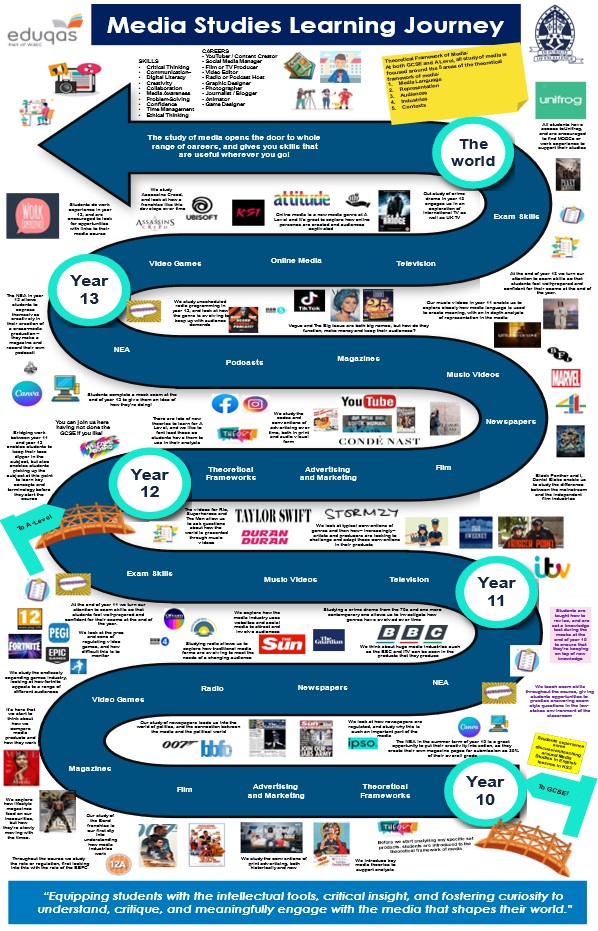Media
The Media Studies Department
“Equipping students with the intellectual tools, critical insight, and fostering curiosity to understand, critique, and meaningfully engage with the media that shapes their world." BD Media Motto
Media Studies is one of our most popular and exciting subjects—full of creativity, big ideas, and real-world relevance. Offered at both GCSE and A-Level, our dynamic curriculum brings the fast-moving world of media to life. From TV and film to magazines, social media, and online platforms, students explore how media shapes the way we see the world—and how we can shape it in return.
In lessons, students learn to think critically about the messages behind media texts, explore audience behaviour, and study influential media theories that explain how and why media affects us. There’s a strong focus on essay writing and building structured arguments, helping students develop their communication skills and confidence in expressing their ideas—skills that are essential across many subjects and future careers.
As a media student, you'll acquire a diverse set of skills crucial for both academic and professional success. You'll develop strong analytical abilities to deconstruct media texts, understand their impact, and engage with audience theories. Practical skills include media production techniques, such as creating and editing content across various platforms, and using industry-standard technology. Additionally, you'll gain proficiency in researching, writing, and presenting media-related information effectively. These skills are complemented by a critical understanding of media industries and their influence on society, preparing you for a range of careers in media and beyond.
Why Study Media
Media Studies is a respected academic subject that develops critical thinking, analytical writing, and creative production skills. Students gain a solid foundation in media theory and industry insight—preparing them for A-Level study, university, and beyond.
This subject opens up diverse and fast-growing career paths in areas like journalism, film and TV, digital marketing, advertising, content creation, and public relations. With the rise of digital media and global communications, demand for skilled media professionals continues to grow—and so does the earning potential. Roles in media strategy, production, and digital communications offer competitive salaries and long-term career progression.
For students who enjoy both creative work and critical thinking, Media Studies offers a pathway to academic success and a future in one of the most dynamic industries out there.
Media through Key Stages
Media Studies at Key Stages 4 and 5 offers a dynamic journey from foundational exploration at GCSE to deeper theoretical analysis and independent production work at A-Level—building students’ confidence, creativity, and critical understanding every step of the way.
Key Stage 4
At GCSE, the Media Studies course provides a strong foundation in understanding how media works and why it matters. Students explore a wide range of media forms—such as film, television, print, advertising, and online content—learning how they are created, structured, and received by audiences. Through engaging case studies and practical tasks, students begin to develop key analytical skills, examining how media messages are constructed and how they reflect or influence society. The course also includes hands-on production work, where students create their own media products, applying their learning in a creative and practical context. GCSE Media Studies builds essential skills in critical thinking, communication, and digital literacy, laying the groundwork for further study at A-Level and beyond.
Key Stage 5
At A-Level, the Media Studies program builds on this foundation with a more advanced and nuanced approach. Students delve deeper into media theories, examining how media shapes and reflects cultural narratives and societal issues. They engage in detailed case studies of different media forms, exploring their conventions, production processes, and audience engagement strategies. The A-Level curriculum emphasizes both theoretical analysis and practical application, culminating in a major project where students produce their own media content. This rigorous and creative course prepares students for higher education and careers in media, communication, and related fields, fostering both analytical and practical expertise.
Curriculum Map

Enrichment Opportunities
Our Media Studies programme is enriched with a wide range of exciting opportunities that bring learning to life and connect students with the real world of media.
We offer inspiring trips to industry-leading destinations such as Sky Studios, Warner Bros. Harry Potter Studios, The Guardian newsroom, the BFI for study days, the Museum of Brands, and a cutting-edge video game experience. These visits give students a behind-the-scenes look at how media is made, marketed, and consumed.
In school, students develop practical skills by getting involved in filming events, creating content for the school community, and using professional-grade equipment and software. We also welcome a variety of guest speakers—including a BBC journalist and a UX designer—who share their insights into working in the media industry.
Career-focused workshops help students explore future pathways in media, communications, and creative industries, giving them a head start in planning their next steps. With so many enriching experiences on offer, Media Studies is not just a subject—it’s a gateway to the wider media world.





